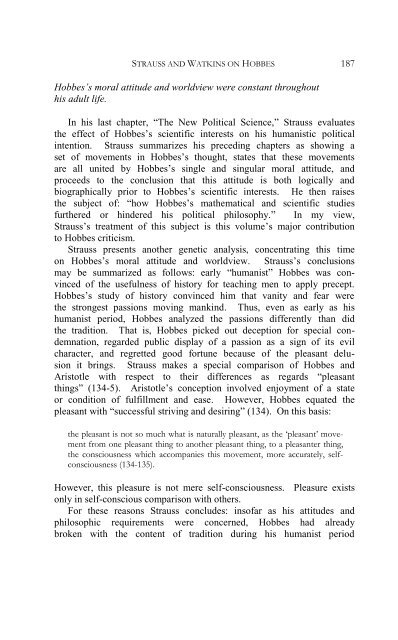Strauss and Watkins on Hobbes' Political Philosophy: A Review
Strauss and Watkins on Hobbes' Political Philosophy: A Review
Strauss and Watkins on Hobbes' Political Philosophy: A Review
You also want an ePaper? Increase the reach of your titles
YUMPU automatically turns print PDFs into web optimized ePapers that Google loves.
STRAUSS AND WATKINS ON HOBBES 187<br />
Hobbes’s moral attitude <str<strong>on</strong>g>and</str<strong>on</strong>g> worldview were c<strong>on</strong>stant throughout<br />
his adult life.<br />
In his last chapter, “The New <strong>Political</strong> Science,” <str<strong>on</strong>g>Strauss</str<strong>on</strong>g> evaluates<br />
the effect of Hobbes’s scientific interests <strong>on</strong> his humanistic political<br />
intenti<strong>on</strong>. <str<strong>on</strong>g>Strauss</str<strong>on</strong>g> summarizes his preceding chapters as showing a<br />
set of movements in Hobbes’s thought, states that these movements<br />
are all united by Hobbes’s single <str<strong>on</strong>g>and</str<strong>on</strong>g> singular moral attitude, <str<strong>on</strong>g>and</str<strong>on</strong>g><br />
proceeds to the c<strong>on</strong>clusi<strong>on</strong> that this attitude is both logically <str<strong>on</strong>g>and</str<strong>on</strong>g><br />
biographically prior to Hobbes’s scientific interests. He then raises<br />
the subject of: “how Hobbes’s mathematical <str<strong>on</strong>g>and</str<strong>on</strong>g> scientific studies<br />
furthered or hindered his political philosophy.” In my view,<br />
<str<strong>on</strong>g>Strauss</str<strong>on</strong>g>’s treatment of this subject is this volume’s major c<strong>on</strong>tributi<strong>on</strong><br />
to Hobbes criticism.<br />
<str<strong>on</strong>g>Strauss</str<strong>on</strong>g> presents another genetic analysis, c<strong>on</strong>centrating this time<br />
<strong>on</strong> Hobbes’s moral attitude <str<strong>on</strong>g>and</str<strong>on</strong>g> worldview. <str<strong>on</strong>g>Strauss</str<strong>on</strong>g>’s c<strong>on</strong>clusi<strong>on</strong>s<br />
may be summarized as follows: early “humanist” Hobbes was c<strong>on</strong>-<br />
vinced of the usefulness of history for teaching men to apply precept.<br />
Hobbes’s study of history c<strong>on</strong>vinced him that vanity <str<strong>on</strong>g>and</str<strong>on</strong>g> fear were<br />
the str<strong>on</strong>gest passi<strong>on</strong>s moving mankind. Thus, even as early as his<br />
humanist period, Hobbes analyzed the passi<strong>on</strong>s differently than did<br />
the traditi<strong>on</strong>. That is, Hobbes picked out decepti<strong>on</strong> for special c<strong>on</strong>-<br />
demnati<strong>on</strong>, regarded public display of a passi<strong>on</strong> as a sign of its evil<br />
character, <str<strong>on</strong>g>and</str<strong>on</strong>g> regretted good fortune because of the pleasant delu-<br />
si<strong>on</strong> it brings. <str<strong>on</strong>g>Strauss</str<strong>on</strong>g> makes a special comparis<strong>on</strong> of Hobbes <str<strong>on</strong>g>and</str<strong>on</strong>g><br />
Aristotle with respect to their differences as regards “pleasant<br />
things” (134-5). Aristotle’s c<strong>on</strong>cepti<strong>on</strong> involved enjoyment of a state<br />
or c<strong>on</strong>diti<strong>on</strong> of fulfillment <str<strong>on</strong>g>and</str<strong>on</strong>g> ease. However, Hobbes equated the<br />
pleasant with “successful striving <str<strong>on</strong>g>and</str<strong>on</strong>g> desiring” (134). On this basis:<br />
the pleasant is not so much what is naturally pleasant, as the ‘pleasant’ move-<br />
ment from <strong>on</strong>e pleasant thing to another pleasant thing, to a pleasanter thing,<br />
the c<strong>on</strong>sciousness which accompanies this movement, more accurately, self-<br />
c<strong>on</strong>sciousness (134-135).<br />
However, this pleasure is not mere self-c<strong>on</strong>sciousness. Pleasure exists<br />
<strong>on</strong>ly in self-c<strong>on</strong>scious comparis<strong>on</strong> with others.<br />
For these reas<strong>on</strong>s <str<strong>on</strong>g>Strauss</str<strong>on</strong>g> c<strong>on</strong>cludes: insofar as his attitudes <str<strong>on</strong>g>and</str<strong>on</strong>g><br />
philosophic requirements were c<strong>on</strong>cerned, Hobbes had already<br />
broken with the c<strong>on</strong>tent of traditi<strong>on</strong> during his humanist period
















